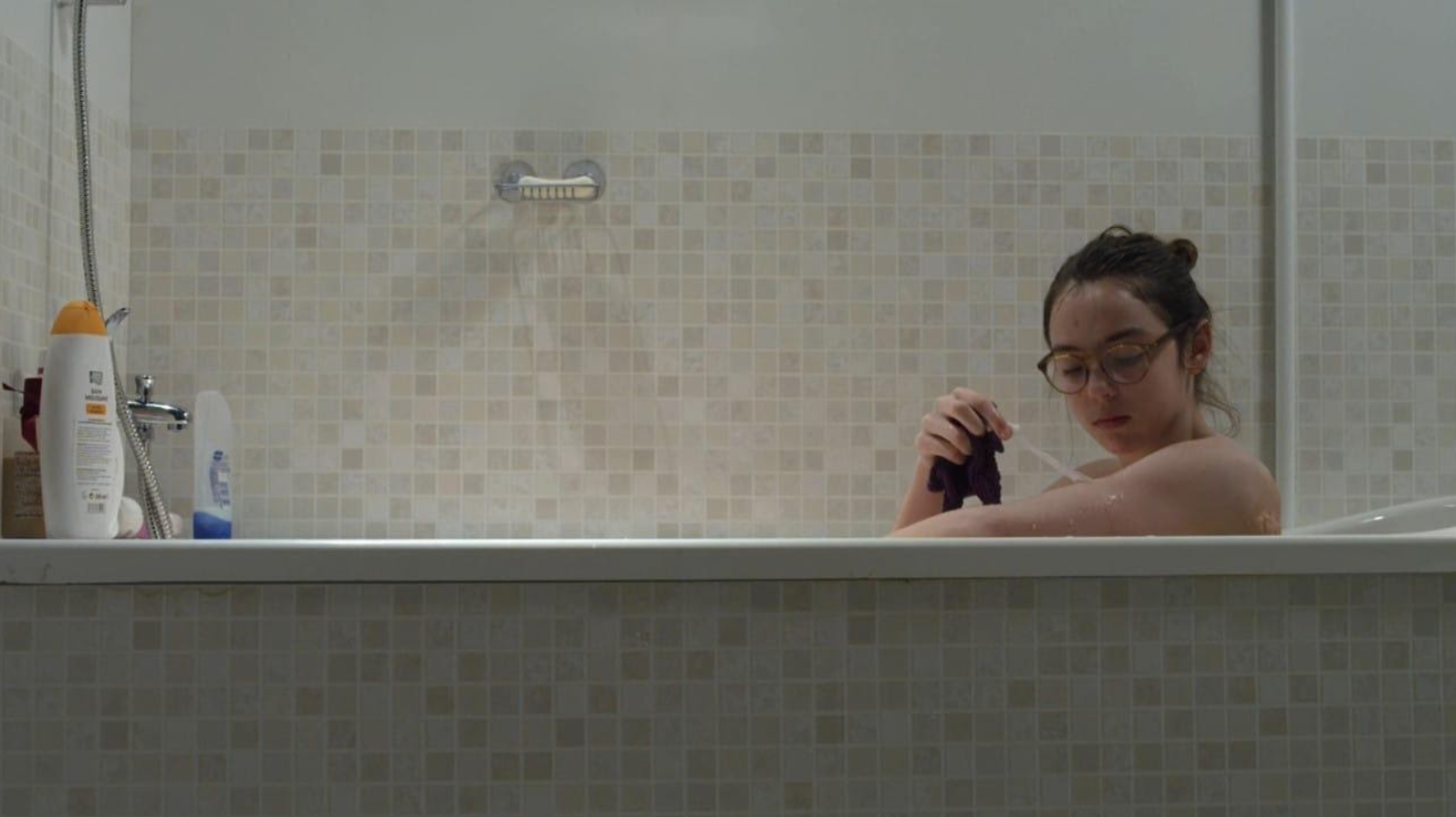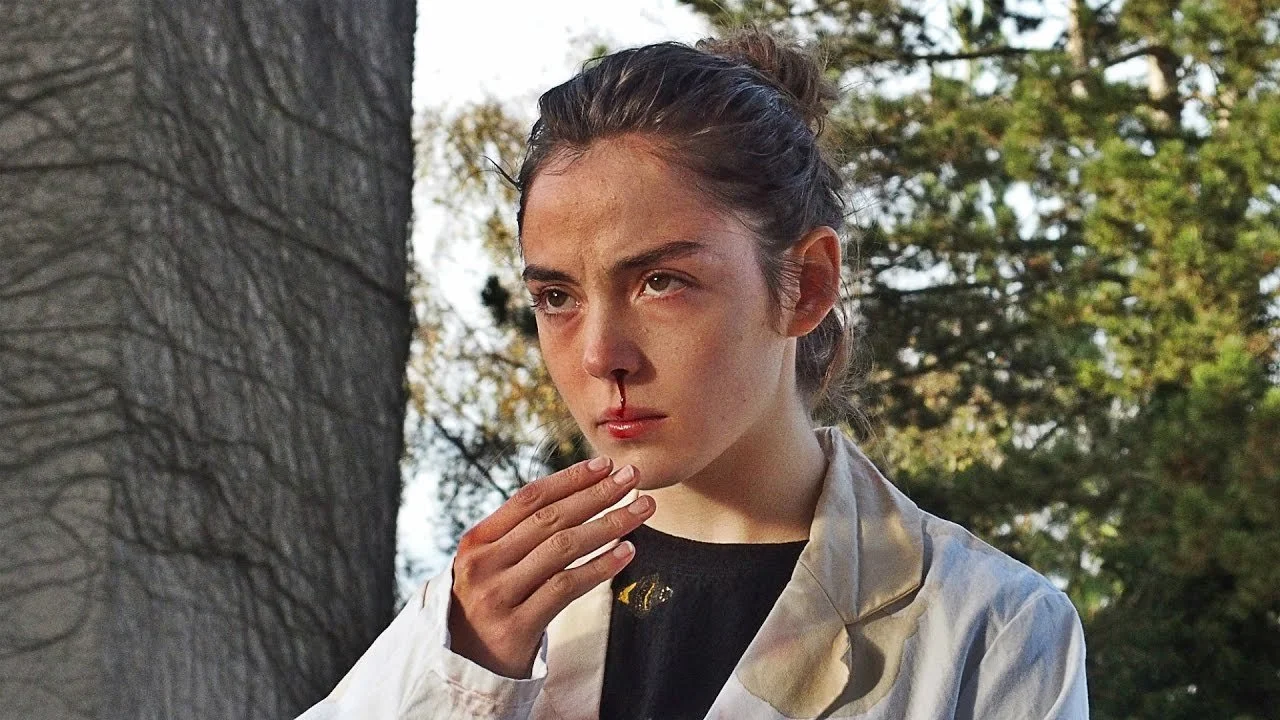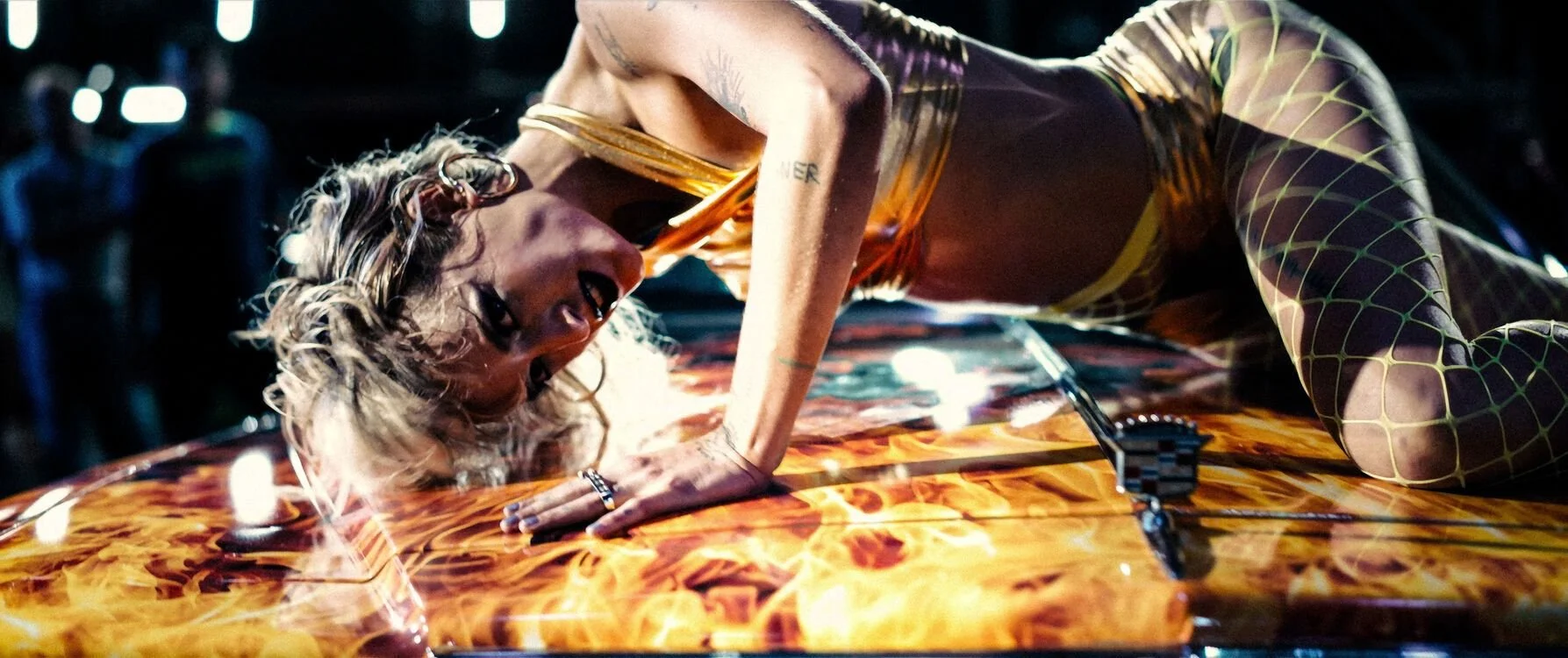[Editorial] Hearts of Darkness: “Touch With Your Eyes” - Julia Ducournau’s Cinema of Sensation
This article contains spoilers for Julia Ducournau’s work, including Junior (2011), Raw (2016) and Titane (2021).
During the magnetic, roaming camera sequence set to Doing It To Death by The Kills early in Titane, a man is removed from the show after touching one of the girls. As he is removed he is told, ‘touch with your eyes’. While this obviously makes sense in the context of the film, this can be applied to Ducournau’s work. Her frequently transgressive films centre on women in a state of flux in a way that is rich, both in terms of tactile gore and human connection.
Whether or not Ducournau’s work should be included within discussion of extreme cinema is debatable, given the nihilism that punctuates many entries in New French Extremity. Ducournau’s work is grisly and has a preoccupation with the body in transformation, but is also imbued with empathy, understanding and even hope. For the focus on the body and taboo, Ducournau’s films comfortably fit under the banner of ‘cinema of sensation’. Cinema of Sensation is a term coined by Martine Beugnet to describe films that focus on the ‘aesthetic of sensation, where the material dimension of a cinematic work is initially given precedence over its expository and mimetic/realistic functions. These functions, however, are not discounted; they are, rather, addressed through the prism of the medium’s material qualities’ (Beugnet 2007: 14).
There is a refreshing honesty in how Ducournau tackles the often messy business of becoming and navigating the world as a woman. Horror has always been a space for monstrous transformations. Ducournau understands and embraces the genre’s ability to have these conversations. She has said, ‘I think there is a violence that is very specific to female film-makers, as far as horror is concerned – a violence that is inside, not a violence you have to fight, a violence you have to handle within yourself. This inside-outside thing makes the whole difference’ (Guardian).
Even with only a few films under her belt, it is hard to think of any other director who has put such a personal stamp on their output thus far. Her ability, as expressed in her solo work, to merge the darkest of comic moments with a level of deep, human sincerity is incredible.
Junior
In Junior, the titular tomboy (Garance Marillier) undergoes a transformation into an ‘acceptable’ vision of a young woman in society. Initially comfortable in her friendship with boys while keeping a distance from other girls at school, she soon finds herself dramatically transforming.
Junior’s transformation into Justine is initially uncomfortable and the scenes of skin flaking and peeling are certainly difficult to watch. However, the physical transformation serves mainly to show how others react to her. It becomes a caterpillar to butterfly change that invokes the tropes of American high school makeover movies, albeit with a body horror twist. Junior emerges as Justine, hair down, fitted clothes instead of her hoodie and suddenly, the boy who has previously been a friend appears ready to be something more. At the end of the film he kisses her, stating that she isn’t ugly any more. That there is an ugly, uncomfortable and frequently painful process behind closed doors is the only way for her to be accepted in wider society.
Another girl at the school speaks about her mother wanting to keep her skin as a reminder, an indication that all the girls have experienced this uncomfortable change but it is one that is celebrated by those around them. A natural shift into womanhood that is far from beautiful. It would be easy to write this off as a saccharine and even disappointing narrative but the film clearly positions Justine as still being the tomboy underneath, as she is seen play-fighting with her friend as they walk away together. It is a powerful statement about how appearances needn’t dictate behaviour. Justine can be Justine and Junior all at once.
Raw
In Raw, Justine (Marillier again) plays a quiet veterinary student about to continue a family tradition by enrolling in the same school they attended. Upon her arrival, a curious hazing ritual changes the life-long vegetarian into someone with a much darker appetite.
Ducournau has said of Justine’s situation in Raw that ‘her monstrosity had her emancipated’ (IndieWire). Transformation in Ducournau’s work is both liberating and restrictive, each with a new set of rules. Justine’s initial meekness means she is ignored and struggles to find her footing in the hyper-sexualised environment of the school. Dressing in fishnet tights and a short dress, Justine lip-syncs to a rap song and smears lipstick over her face before attending a party. Again, Ducournau uses appearance to invoke confidence and a sense of becoming, of reinvention, but it holds a sense of danger and sharp edges.
Raw’s focus on unconventional family units, with Justine’s difficult relationship with sister Alexia (Ella Rumpf) and the secrets their parents (Laurent Lucas and Joana Preiss) have kept from them taking centre stage. The sisterly relationship evolves as Justine’s identity comes to the fore. The film isn’t afraid to head into the realm of dark comedy (another of Ducournau’s strengths), as a sisterly bonding hair removal session ends in chaos. Raw is a powerful coming-of-age story that reclaims female hunger in all forms.
Titane
In her latest work, Titane, Alexia (Agatha Rousselle) plays a dancer, who is attracted to cars, which could be the result of a childhood accident (although your mileage may vary on that - there is certainly enough in the opening scene that suggests Alexia’s detachment from humans and responsiveness to cars is fully-formed by the time we first see her). In addition to being a dancer, she is also a serial killer, whose latest spree forces her to flee from the police. With the glare of the police on her, she transforms herself into Adrien - a young man who disappeared as a child.
Perhaps curiously for a Julia Ducournau film, Titane is the first that sees a character transform from female to male. Agatha Rousselle has stated that the film is not an allegory for transgender experience (Dazed Digital), given that Alexia’s decision to change herself into Adrien is born of selfish, self-protective reasons rather than identity. Given Ducournau’s openness to genre fluidity and not being defined, this is hardly a film that views gender as a binary and it is the play with masculinity, femininity and all the spaces in between that affords the film some of its most compelling and effectively emotional moments.
During a scene in Titane Alexia (now disguised as Adrien) sits on a bus, ready to flee her new life. Another woman is also seated close by and soon attracts the attention of some young men at the back of the bus. As their comments take a sexually aggressive turn, the woman looks to Adrien for comfort, or even intervention. As the tirade from the men continues, Alexia is suddenly rendered vulnerable. It presents a view of the life she left behind: aggressive fans who have developed parasocial relationships, sexualised performance that commands attention but leaves her ultimately empty and her distant father. In that moment, she calculates that her new life as Adrien, however much it is based on a lie, is the better option. As the bus leaves, Alexia remains at the stop, ready to return to Vincent and opting out of her former life.
The use of arresting imagery is often the headline, with rumours of people passing out or vomiting during screenings, but Ducournau’s true strength is in the humanity she places in her films - misunderstood characters searching for love and belonging, the feeling that there is no one right way to be a woman and that gender is fluid, not restrictive. Ducournau’s women are bold, flawed but ultimately incredibly human as they carve their space in the world.
There is a sincere quality to her work, embedding the horror elements in her narrative when some would rather write them off as shock value. Even the most impactful moments of Ducournau’s work never feels intended to make people recoil, but to draw them in, to look more closely at the transformation. Referring to Titane’s wince-worthy bathroom scene in The Guardian she calls attention to the restraint employed, ‘You don’t see anything. For me that’s a whole achievement. All is about how I make you anticipate the worst, and because I plant this idea in your head, you can actually get to feel her pain’. In her carefully crafted and immensely thoughtful film-making she is able to inspire empathy and invoke a visceral response. With only two solo features Julia Ducournau has already created a powerful body of work with themes that both transgress and transcend.
References
Beugnet, Martine. Cinema and Sensation : French Film and the Art of Transgression, Edinburgh University Press, 2007
https://www.theguardian.com/film/2021/nov/21/julia-ducournau-titane-interview-raw
https://www.indiewire.com/2021/07/julia-ducournau-interview-palme-dor-titane-1234652010/






![[Editorial] In Her Eyes: Sara Lowes in Witchfinder General (1968)](https://images.squarespace-cdn.com/content/v1/5fe76a518d20536a3fbd7246/1655655953171-8K41IZ1LXSR2YMKD7DW6/hilary-heath.jpeg)
![[Editorial] The Babadook (2014)](https://images.squarespace-cdn.com/content/v1/5fe76a518d20536a3fbd7246/1651937631847-KR77SQHST1EJO2729G7A/Image+1.jpg)
![[Editorial] In Her Eyes: Helen Lyle in Candyman (1992)](https://images.squarespace-cdn.com/content/v1/5fe76a518d20536a3fbd7246/1649586854587-DSTKM28SSHB821NEY7AT/image1.jpg)
![[Editorial] Lorraine Warren’s Clairvoyant Gift](https://images.squarespace-cdn.com/content/v1/5fe76a518d20536a3fbd7246/1648576580495-0O40265VK7RN03R515UO/Image+1+%281%29.jpg)
![[Editorial] Sara in Creep 2 (2017)](https://images.squarespace-cdn.com/content/v1/5fe76a518d20536a3fbd7246/1646478850646-1LMY555QYGCM1GEXPZYM/27ebc013-d50a-4b5c-ad9c-8f8a9d07dc93.jpg)
![[Editorial] Sally Hardesty in The Texas Chainsaw Massacre (1974)](https://images.squarespace-cdn.com/content/v1/5fe76a518d20536a3fbd7246/1637247162929-519YCRBQL6LWXXAS8293/the-texas-chainsaw-final-girl-1626988801.jpeg)
![[Editorial] Margaret Robinson: Hammer’s Puppeteer](https://images.squarespace-cdn.com/content/v1/5fe76a518d20536a3fbd7246/1630075489815-33JJN9LSGGKSQ68IGJ9H/MV5BMjAxMDcwNDI2Nl5BMl5BanBnXkFtZTcwOTMxODgzMQ%40%40._V1_.jpg)
![[Editorial] Re-assessing The Exorcist: Religion, Abuse, and The Rise of the Feminist Mother.](https://images.squarespace-cdn.com/content/v1/5fe76a518d20536a3fbd7246/1629995626135-T5K61DZVA1WN50K8ULID/image2.jpg)
![[Editorial] Unravelling Mitzi Peirone’s Braid (2018)](https://images.squarespace-cdn.com/content/v1/5fe76a518d20536a3fbd7246/1628359114427-5V6LFNRNV6SD81PUDQJZ/4.jpg)
![[Editorial] American Psycho (2000)](https://images.squarespace-cdn.com/content/v1/5fe76a518d20536a3fbd7246/1627317891364-H9UTOP2DCGREDKOO7BYY/american-psycho-bale-1170x585.jpg)














![[Editorial] Oscar Nominations 2026: Where to stream all the horror picks](https://images.squarespace-cdn.com/content/v1/5fe76a518d20536a3fbd7246/1769113319180-4INRRNMZK4DZLHRSUXX5/rev-1-GRC-TT-0026r_High_Res_JPEG-1024x372.jpeg)
![[Editorial] 10 Films & Events to Catch at Soho Horror Film Fest 2023](https://images.squarespace-cdn.com/content/v1/5fe76a518d20536a3fbd7246/1700819417135-299R7L4P0B676AD3RO1X/Screenshot+2023-11-24+at+09.41.52.png)
![[Editorial] 9 Horror Nintendo Switch Games To Play](https://images.squarespace-cdn.com/content/v1/5fe76a518d20536a3fbd7246/1697214470057-3XZXX8N4LYIMDFWS6Z3P/Screenshot+2023-10-13+at+17.20.13.png)
![[Mother of Fears] Mothering in Silence in A Quiet Place (2018)](https://images.squarespace-cdn.com/content/v1/5fe76a518d20536a3fbd7246/1696445921315-HZJ2DZYQIH6VVWXBO2YL/Screenshot+2023-10-04+at+19.52.29.png)
![[Editorial] 5 Female Focused Horror Book Recommendations](https://images.squarespace-cdn.com/content/v1/5fe76a518d20536a3fbd7246/1696441981361-52EQCTJ7AT2QF1927GM7/919xtm6d3fL._AC_UF894%2C1000_QL80_.jpg)
![[Editorial] 9 Best Slashers Released Within 10 Years of Scream (1996)](https://images.squarespace-cdn.com/content/v1/5fe76a518d20536a3fbd7246/1695478839037-LOFHGVM3H6BMSZW7G83M/Screenshot+2023-09-23+at+15.15.11.png)
![[Mother of Fears] Mother Vs. Monster in Silent Hill (2006)](https://images.squarespace-cdn.com/content/v1/5fe76a518d20536a3fbd7246/1695485781119-H6GNP0G3J2TLPAOIABV7/Screenshot+2023-09-23+at+17.11.56.png)
![[Editorial] 9 Terrifying Cerebral Visions in Horror Movies](https://images.squarespace-cdn.com/content/v1/5fe76a518d20536a3fbd7246/1693509801235-X23OL50T1DVGECH0ZJK2/MV5BMjQ0MTg2MjQ4MV5BMl5BanBnXkFtZTgwMTU3NDgxMTI%40._V1_.jpg)

Possessor is a slick futuristic thriller in which Tasya Vos, an assassin for hire, must manage her responsibilities as an elite killing machine and complex feelings towards her husband and son, whilst taking on another high-profile job that will push her to the edge of her sanity.